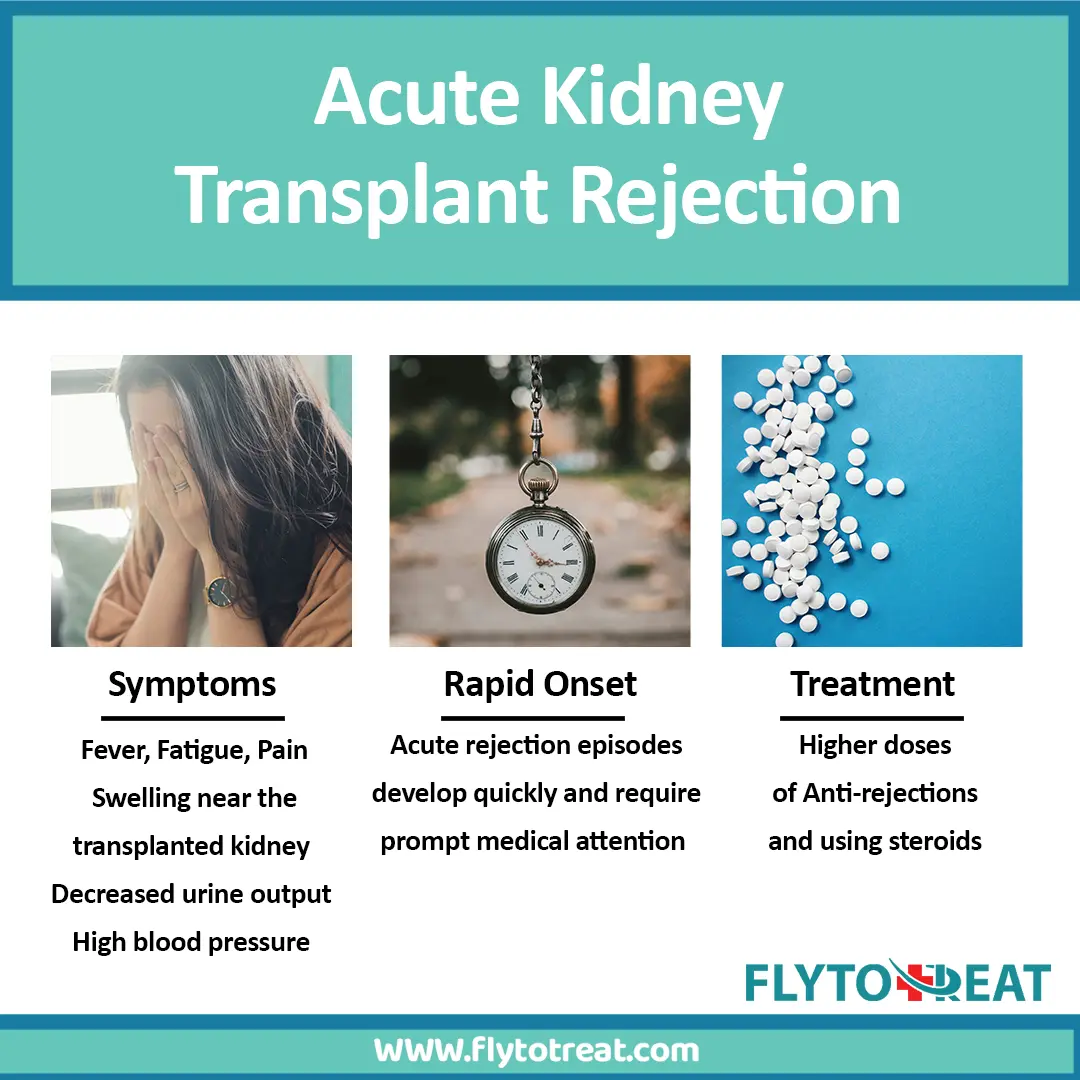
What is a silent rejection of a kidney transplant?
Kidney transplant rejection is a concern for recipients, and understanding the rules is crucial. Statistics show that the risk of acute rejection within the first year post-transplant is around 7.9%, emphasizing the need for vigilance. FlyToTreat simplifies this complex subject by providing key information on how to recognize early signs and manage risks for a successful outcome. In this article, we answer pressing questions about reversal possibilities, side effects of anti-rejection drugs, and common symptoms of kidney transplant rejection. Factors contributing to rejection include genetic mismatches, nonadherence to immunosuppressive medication, and pre-existing antibodies, underscoring the importance of personalized care plans and regular medical follow-up.
What is Kidney Transplant Rejection?
Although advances in medicine have significantly decreased the risk of kidney transplant rejection, it can still occur in some patients. Kidney rejection happens when the body's immune system recognizes and attacks the transplanted kidney as foreign. This can damage the kidney and prevent it from functioning correctly. Early detection and treatment of rejection are crucial to avoid long-term damage and ensure the success of the transplant. Regular monitoring and adherence to immunosuppressive medications are vital in reducing the risk of rejection.
What Causes Kidney Transplant Rejection?
Several factors can influence the risk of renal transplant rejection, which we know them as kidney transplant requirement. While some factors, like donor age or genetics, are uncontrollable, others can be managed to decrease the risk.
• Matching factors: A good match between the donor and recipient's Human Leukocyte Antigens (HLA) can significantly reduce rejection risks.
• Immunosuppressive medications: Adherence to these medications is crucial in preventing the immune system from attacking the transplanted kidney.
• Other medical conditions: Certain conditions, such as pre-existing sensitization or delayed graft function, can increase rejection risk.
It's important to note that this list is incomplete. Consulting with a transplant specialist can help you understand your risk factors and how to manage them for a successful transplant outcome.
Warning Signs of a Kidney Transplant Rejection
Early detection and treatment of kidney rejection are crucial to maximize the success of your transplant. Be aware of these warning signs and symptoms of renal transplant rejection and consult your doctor promptly if you experience any of them:
• Fever: Fever can occur with various conditions, but if accompanied by other symptoms, it warrants medical attention.
• Tenderness around the transplant site: Pain or tenderness in the area of your transplanted kidney can be a sign of rejection.
• Flu-like symptoms: Chills, nausea, vomiting, diarrhea, body aches, and headache can be mistaken for the flu, but they could also indicate rejection.
• Fatigue: Unusual tiredness can indicate kidney rejection or other conditions.
• Swelling: Unexplained swelling, particularly in your hands and feet, can be a sign of fluid retention due to kidney problems.
• High blood pressure: New or worsening high blood pressure can be associated with kidney rejection.
• Weight gain: Rapid weight gain, especially unexplained fluid gain, can be among kidney transplant failure symptoms.
Remember, this list is not exhaustive. If you experience any unusual symptoms after your transplant, consult your doctor right away for proper diagnosis and treatment.
Signs of kidney transplant rejection after 2 years
Kidney rejection symptoms can occur at any time after a transplant, even years later. Here's what to watch out for:
• General Flu-like Symptoms: Fever, chills, fatigue, and body aches can be signs of rejection, even two years post-transplant.
• Changes in Urine Output: A sudden decrease in urine production or blood in the urine could indicate rejection.
• Pain or Tenderness: Discomfort or swelling around the transplanted kidney may be a warning sign.
• High Blood Pressure: Unexplained increases in blood pressure can be associated with transplant rejection.
Remember: These kidney rejection symptoms can also arise from other causes. Early detection is crucial, so consult your doctor if you experience these signs after your transplant, regardless of the time elapsed.
kidney transplant rejection rates
The risk of kidney rejection opposite of the kidney transplant success rate during the first year after surgery is generally low, ranging from 5% to 10%, depending on various factors. According to the American Society of Transplantation (AST), the overall incidence of acute rejection within the first year is around 7.9%. Several factors can influence individual rejection risks, including age, underlying medical conditions, and the type of donor (living vs. deceased). Living-donor transplants tend to have lower rejection rates due to better matching and shorter cold ischemia time.
Acute kidney transplant rejection
Acute kidney transplant rejection occurs when the body's immune system identifies the transplanted kidney as foreign and attacks it. This typically happens within the first few months after surgery. Here's a breakdown of key points:
• Symptoms: Fever, fatigue, pain or swelling near the transplanted kidney, decreased urine output, and high blood pressure can be warning signs.
• Rapid Onset: Acute rejection episodes develop quickly and require prompt medical attention.
• Treatment: Adjusting anti-rejection medications or using steroids are common treatment approaches. Early diagnosis is crucial for successful management and preserving the transplanted kidney.

Acute rejection is a serious complication, but with early detection and treatment, the transplanted kidney's function can often be restored. Regular monitoring and open communication with your doctor are essential. Read more Here
Cellular rejection kidney transplant
Cellular rejection is the most frequent form of kidney transplant rejection. Here's what you need to know:
• Immune Cell Attack: This type of rejection occurs when T lymphocytes, a kind of white blood cell in your immune system, recognize the transplanted kidney as foreign and attack it.
• Symptoms: Signs can be similar to general rejection, including fever, fatigue, and changes in urine output. Close monitoring of kidney function is crucial for early detection.
• Treatment Options: Adjusting immunosuppressant medications is a primary approach. Early diagnosis and intervention are crucial to preventing long-term damage to the transplanted kidney.
Remember: Cellular rejection is treatable, but early detection is essential. If you experience any potential signs of rejection, consult your doctor immediately for prompt diagnosis and treatment.
Chronic active antibody-mediated rejection
Chronic active antibody-mediated rejection (CAAMR) is a distinct form of kidney transplant rejection. Here's why vigilance is critical:
• Sneaky Onset: CAAMR often develops months or even years after transplant, making detection more challenging.
• Antibody Attack: Pre-existing antibodies in the recipient's blood attack the transplanted kidney over time.
• Symptoms: Similar to rejection types, signs may include high blood pressure, decreased urine output, and fatigue. Regular check-ups and monitoring are crucial for early identification.
• Treatment Challenges: There's no single cure for CAAMR, but treatment focuses on managing the immune response and preserving kidney function as much as possible.
Remember: CAAMR requires ongoing monitoring and management. Consulting your doctor regularly and reporting any potential signs of rejection is essential for long-term transplant success.
kidney transplant rejection ICD 10
The International Classification of Diseases, Tenth Revision (ICD-10) provides a standardized coding system for diagnoses. Here's what you need to know about kidney transplant rejection:
• Specific Code: The primary ICD-10 code for kidney transplant rejection is T86.11.
• Meaning: This code signifies unspecified kidney transplant rejection.
• Additional Codes: For more specific diagnoses, doctors may use additional codes to indicate the type of rejection, such as acute (T86.11) or chronic (not separately coded).
Remember: ICD-10 codes are used for medical billing and record-keeping. If you're concerned about potential rejection, it's most important to focus on symptoms and consult your doctor.
conclusion
Recognizing kidney transplant rejection early is vital, and with FlyToTreat's guidance, patients can feel confident in managing their health post-transplant. Regular check-ups and strict adherence to medication schedules are crucial to maintaining the success of a kidney transplant and ensuring a better quality of life.
MEDICALLY REVIEWED BY: Dr. Ali Bazazi
AUTHOR: FlytoTreat's team of Authors
08 April 2024 - Updated At: 05 November 2024
Related Articles
Comment





